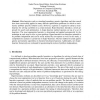Free Online Productivity Tools
i2Speak
i2Symbol
i2OCR
iTex2Img
iWeb2Print
iWeb2Shot
i2Type
iPdf2Split
iPdf2Merge
i2Bopomofo
i2Arabic
i2Style
i2Image
i2PDF
iLatex2Rtf
Sci2ools
103
click to vote
IDA
2008
Springer
2008
Springer
A comprehensive analysis of hyper-heuristics
Meta-heuristics such as simulated annealing, genetic algorithms and tabu search have been successfully applied to many difficult optimization problems for which no satisfactory problem specific solution exists. However, expertise is required to adopt a metaheuristic for solving a problem in a certain domain. Hyper-heuristics introduce a novel approach for search and optimization. A hyper-heuristic method operates on top of a set of heuristics. The most appropriate heuristic is determined and applied automatically by the technique at each step to solve a given problem. Hyper-heuristics are therefore assumed to be problem independent and can be easily utilized by non-experts as well. In this study, a comprehensive analysis is carried out on hyper-heuristics. The best method is tested against genetic and memetic algorithms on fourteen benchmark functions. Additionally, new hyperheuristic frameworks are evaluated for questioning the notion of problem independence.
Difficult Optimization Problems | Hyper-heuristics | IDA 2008 | Information Technology | Satisfactory Problem |
Related Content
| Added | 10 Dec 2010 |
| Updated | 10 Dec 2010 |
| Type | Journal |
| Year | 2008 |
| Where | IDA |
| Authors | Ender Özcan, Burak Bilgin, Emin Erkan Korkmaz |
Comments (0)

